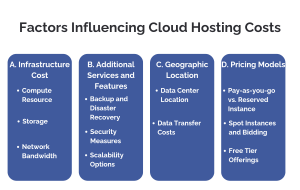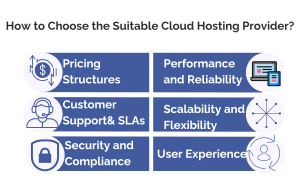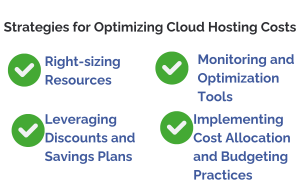 In today’s world, cloud hosting has emerged as the backbone of modern businesses, offering unparalleled scalability, flexibility, and efficiency. However, navigating the complexities of cloud hosting costs can be daunting for both seasoned professionals and newcomers alike. Understanding the intricacies of cloud hosting expenses is not only crucial for optimizing resources but also for ensuring the financial health of your organization.
In today’s world, cloud hosting has emerged as the backbone of modern businesses, offering unparalleled scalability, flexibility, and efficiency. However, navigating the complexities of cloud hosting costs can be daunting for both seasoned professionals and newcomers alike. Understanding the intricacies of cloud hosting expenses is not only crucial for optimizing resources but also for ensuring the financial health of your organization.
This comprehensive guide aims to demystify the world of cloud hosting costs, providing you with the knowledge and tools needed to make informed decisions about your infrastructure investment. From exploring the factors that influence pricing to comparing different providers and strategies for cost optimization, this guide covers every aspect of cloud hosting expenses.
Whether you’re a startup looking to minimize overheads, a growing enterprise seeking to scale efficiently, or an IT professional tasked with managing infrastructure budgets, this guide is designed to equip you with the insights and strategies necessary to navigate the complexities of cloud hosting costs effectively.
Join us as we delve into the fascinating realm of cloud hosting expenses, empowering you to harness the full potential of cloud technology while optimizing costs for maximum value and performance.
Factors Influencing Cloud Hosting Costs
Cloud hosting costs are influenced by a variety of factors, each playing a crucial role in determining the overall expenditure. Understanding these factors is essential for making informed decisions about resource allocation and budgeting. Here’s an overview of the key factors influencing cloud hosting costs:
A. Infrastructure Costs
1. Compute Resources (CPU, RAM):
The computational power required by your applications directly impacts costs. Higher CPU and RAM allocations result in increased pricing.
2. Storage (HDD, SSD):
The type and amount of storage needed for data storage affect costs. SSD storage typically commands a higher price due to its faster performance.
3. Network Bandwidth:
Data transfer rates between servers and users incur charges. Higher bandwidth requirements lead to higher costs.
B. Additional Services and Features
1. Backup and Disaster Recovery:
Implementing robust backup and disaster recovery solutions incurs additional expenses but is essential for data protection and business continuity.
2. Security Measures (Firewalls, Encryption):
Enhancing security through firewalls, encryption, and other measures adds to hosting costs but mitigates the risk of data breaches and cyberattacks.
3. Scalability Options:
Choosing scalable hosting solutions allows for dynamic resource allocation based on demand, but may come with additional costs associated with auto-scaling features.

C. Geographic Location
1. Data Center Location:
The physical location of data centers influences costs due to differences in infrastructure, labor, and regulatory compliance across regions.
2. Data Transfer Costs:
Data transfer between regions or across different networks may incur additional charges, particularly for large volumes of data.
D. Pricing Models
1. Pay-as-you-go vs. Reserved Instance:
Pay-as-you-go models offer flexibility but may be more expensive in the long run. Reserved instances provide discounts for committing to specific resource allocations over a fixed term.
2. Spot Instances and Bidding:
Spot instances allow users to bid for unused cloud capacity at discounted rates, but availability is not guaranteed and prices fluctuate based on demand.
3. Free Tier Offerings:
Some cloud providers offer free tiers with limited resources for users to explore their services, with charges applied once usage exceeds predefined thresholds.
By understanding these factors and their implications on cloud hosting costs, organizations can optimize their infrastructure spending while ensuring performance, reliability, and security requirements are met effectively.
How to Choose the Suitable Cloud Hosting Provider?
Selecting the right cloud hosting provider is a critical decision for businesses of all sizes. Each provider offers a unique set of features, pricing structures, and performance capabilities. Conducting a thorough comparison allows you to make an informed choice based on your specific requirements. Here’s a framework for comparing cloud hosting providers:
1. Pricing Structures
Analyze the pricing models offered by each provider, such as pay-as-you-go, reserved instances, and spot instances.
Compare the cost of compute resources, storage, network bandwidth, and additional services across different providers.
Evaluate discounts, savings plans, and free tier offerings available to optimize costs.
2. Performance and Reliability
Assess the performance and reliability of each provider’s infrastructure, including uptime guarantees, latency, and availability zones.
Look for benchmarks and performance testing results to gauge the speed and responsiveness of their services.
Consider factors such as data redundancy, fault tolerance, and disaster recovery capabilities.
3. Customer Support and SLAs
Examine the quality and responsiveness of customer support services provided by each provider, including technical assistance, documentation, and community forums.
Review the service level agreements (SLAs) offered by providers, covering uptime commitments, support response times, and compensation for downtime.

4. Scalability and Flexibility
Evaluate the scalability options offered by each provider, such as auto-scaling, load balancing, and flexible resource allocation.
Consider the range of services and integrations available to support your evolving business needs, including containers, serverless computing, and artificial intelligence (AI) tools.
5. Security and Compliance
Assess the security features and compliance certifications offered by each provider, including data encryption, identity and access management (IAM), and regulatory compliance.
Evaluate the transparency and auditability of security controls, as well as the provider’s track record in handling security incidents.
6. User Experience and Ease of Management
Consider the user interface, management tools, and developer experience provided by each provider, including dashboards, APIs, and command-line interfaces (CLIs).
Evaluate the availability of documentation, tutorials, and training resources to support onboarding and ongoing operations.
By comparing cloud hosting providers across these dimensions, you can identify the best fit for your organization’s requirements, budget, and growth trajectory. Taking the time to conduct a comprehensive evaluation will ensure a successful partnership that maximizes the benefits of cloud technology.
Strategies for Optimizing Cloud Hosting Costs
Optimizing cloud hosting costs is essential for ensuring efficient resource utilization and maximizing the value of your investment. Here’s a breakdown of strategies for achieving cost optimization:
A. Right-sizing Resources:
- Assess your workload requirements regularly and adjust resource allocations accordingly. Right-sizing involves matching your resource provisioning to your actual usage to avoid over-provisioning and under-utilization.
- Utilize tools and metrics provided by your cloud provider to analyze performance and identify opportunities for optimization.
- Consider implementing auto-scaling policies to dynamically adjust resources based on workload demands, ensuring optimal performance while minimizing costs.
B. Leveraging Discounts and Savings Plans:
- Take advantage of discounts and savings plans offered by your cloud provider. These may include reserved instances, spot instances, or committed usage discounts.
- Analyze your usage patterns to determine the most cost-effective purchasing options. For predictable workloads, reserved instances or savings plans may offer significant savings, while spot instances can be leveraged for non-critical or bursty workloads.
- Optimize your usage commitments over time to align with changing workload requirements and maximize savings.

C. Monitoring and Optimization Tools:
- Implement robust monitoring and optimization tools to gain insights into your cloud usage and spending patterns.
- Utilize cost management dashboards provided by your cloud provider to track spending in real-time, set budgets, and receive alerts for cost anomalies.
- Leverage third-party cost optimization tools and services to identify inefficiencies, analyze cost trends, and automate optimization recommendations.
D. Implementing Cost Allocation and Budgeting Practices:
- Establish clear cost allocation and budgeting practices to track spending across teams, projects, and departments.
- Implement tagging and labeling strategies to categorize resources and allocate costs accurately. This enables you to identify cost drivers, optimize spending, and allocate resources effectively.
- Regularly review and adjust your budget allocations based on actual spending and business priorities. Consider implementing chargeback or showback mechanisms to increase accountability and transparency.
By implementing these strategies, organizations can effectively optimize their cloud hosting costs while maintaining performance, reliability, and scalability. Continuous monitoring, analysis, and optimization are key to achieving long-term cost efficiency in the cloud.
Conclusion
In conclusion, managing cloud hosting costs effectively is crucial for organizations to maximize the value of their cloud investments while maintaining financial health. Throughout this guide, we’ve explored various strategies and best practices for optimizing cloud hosting costs.
As you embark on your cloud journey, remember the importance of ongoing monitoring and optimization. Cloud environments are dynamic, and optimizing costs requires continuous vigilance and adjustment. By regularly reviewing your usage patterns, identifying inefficiencies, and implementing optimization strategies, you can ensure that your cloud hosting costs remain aligned with your business objectives.
FAQs
Q-What is the average cost of cloud hosting?
A- The average cost of cloud hosting varies depending on factors such as provider, services used, and usage patterns, but it typically ranges from a few hundred to several thousand dollars per month.
Q- How can I estimate my cloud hosting expenses?
A– You can estimate your cloud hosting expenses by considering factors such as resource usage, pricing models, and additional services needed, using online calculators or consulting with your cloud provider.
Q- Are there any hidden costs associated with cloud hosting?
A- Yes, there can be hidden costs associated with cloud hosting, such as data transfer fees, premium support charges, and costs for additional services or features beyond basic usage.
Q- How can I reduce my cloud hosting costs without sacrificing performance?
A- You can reduce cloud hosting costs without sacrificing performance by optimizing resource allocation, leveraging discounts, implementing efficient scaling strategies, and regularly monitoring and optimizing usage patterns.
Q- What are some common pricing models used by cloud hosting providers?
A– Common pricing models used by cloud hosting providers include pay-as-you-go, reserved instances, spot instances, and free tier offerings, each offering different levels of flexibility and cost savings.


